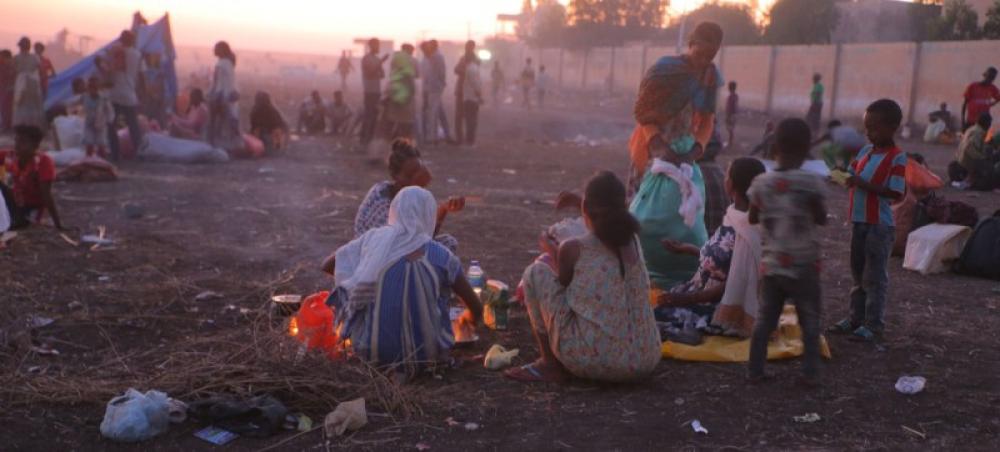Just Earth News | @justearthnews | 17 Nov 2020

UNHCR/Hazim Elhag
New York: A “full-scale humanitarian crisis” is unfolding as thousands of refugees flee ongoing fighting in Ethiopia’s Tigray region each day to seek safety in eastern Sudan, the UN refugee agency (UNHCR) reported on Tuesday.
More than 27,000 have now crossed into Sudan through crossing points in Kassala and Gedaref states, as well as a new location further south at Aderafi, where Ethiopian refugees started crossing over the weekend, according to UNHCR.
The scale of the influx is the worst that part of the country has seen in over 20 years, according to the agency.
“Women, men and children have been crossing the border at the rate of 4,000 per day since 10 November, rapidly overwhelming the humanitarian response capacity on the ground,” said Babar Baloch, UNHCR spokesperson, briefing reporters in Geneva.
“Refugees fleeing the fighting continue to arrive exhausted from the long trek to safety, with few belongings”, he added.
According to news reports, Ethiopian Prime Minister Abiy Ahmed, has indicated the military operation that was launched in response to the reported occupation of a Government military base by Tigrayan forces nearly two weeks ago, would continue, although he said it was now in its “final phase”.
‘Needs continue to grow’
UN agencies, along with relief partners have ramped up assistance – delivering food rations, hot meals and clean water, as well as setting up latrines and temporary shelters. They are also supporting the Sudanese Government in its response. But the needs continue to grow.
The UN World Food Programme (WFP) is also supporting other humanitarian workers in its response, providing fuel for vehicles and generators in remote locations. The UN Humanitarian Air Service, managed by WFP, has also increased flights from three times per week to daily flights for aid workers.
Since Saturday, UNHCR has relocated 2,500 refugees from the border to Um Raquba settlement site, in eastern Sudan. There is however, a “critical need” to identify more sites so that refugees can be relocated away from the border and can access assistance and services, said Mr. Baloch.
UNHCR has also issued an emergency fundraising appeal, through which people can help provide urgent, lifesaving assistance to refugees. Click here to make a donation
‘On standby’ in Tigray
Meanwhile in the Tigray region of Ethiopia itself, lack of electricity, telecommunications, fuel and cash, continue to severely hamper any humanitarian response, the UNHCR spokesperson said.
“After nearly two weeks of conflict, reports of larger numbers of internally displaced grow daily, while the lack of access to those in need, coupled with the inability to move in goods to the region, remain major impediments to providing assistance,” he said.
UNHCR and partners are on standby to provide assistance to the displaced in Tigray, including basic items, when access and security allow.
The conflict is also a major ongoing concern for the Eritrean refugee population of nearly 100,000 in Tigray, who are reliant on assistance from UNHCR and partners.
“Potential for further displacement of refugees inside the country is increasingly a real possibility … The humanitarian situation as result of this crisis is growing rapidly” he warned, reiterating UNCHR’s call for peace and urge all parties to respect the safety and security for all civilians in Tigray.
Call for access: Lowcock
In a statement issued later on Tuesday, UN Emergency Relief Coordinator, Mark Lowcock, said that even before the current hostilities, nearly a million people in Tigray, and millions more who live in close proximity to its regional and national boundaries", were already in need of assistance.
"The current situation is heightening the needs and the vulnerability of local people", said the UN relief chief. "It is disrupting the work of UN and other humanitarian organizations. I call for full access to reach people in need wherever they are; safe passage for civilians seeking assistance; and the security of aid workers. Humanitarian workers must be able to deliver assistance without fear of attack."
Lowcock said the UN was engaging with the Ethiopian Government and other relevant authorities so humanitarians could get "immediate and unimpeded humanitarian access. We are committed to staying and delivering humanitarian assistance", he added.